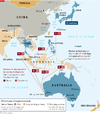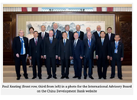Sean K
Moderator
- Joined
- 21 April 2006
- Posts
- 22,278
- Reactions
- 11,530
In regards to fuel and the industrial base and manufacturing etc, let's not forget that if it ever got to a total war situation the entire country is turned to support the war footing. The government will take anything it needs. Not having much of a manufacturing base is a problem for sure, but if the country is at existential threat, we'd be surprised as how quickly things would happen. We came close to this in WW2 but still had spare capacity. Baristas will be be put in uniform first.




